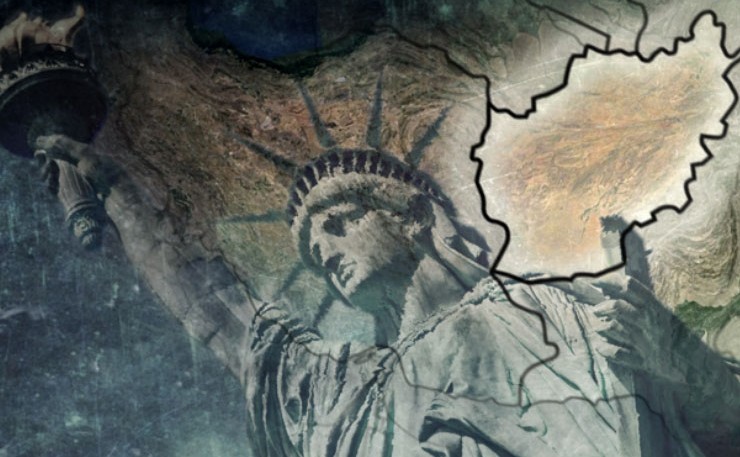Donald Trump found his reason to continue the catastrophic 16-year war in Afghanistan: up to $ 3 trillion of natural resources in the country. His new Afghanistan strategy means more deaths in a war-torn country. Trump is the embodiment of the hostile US Empire, writes Jakob Reimann.
In 1776, the British historian Edward Gibbon wrote in The Decline and Fall of the Roman Empire:
“They endeavored to convince mankind that their motive was not the temptation of conquest but was actuated by the love of order and justice.”
What Gibbon writes about the Imperium Romanum is a general motive of empires. In addition to the hard power – the economic power and, above all, the military power, the conquest, the physical violence – an empire must also be able to successfully compete in the field of soft power: the war over hearts and minds.
Military violence has to be sold to the people just like to the world. It must always be accompanied by a narrative that obfuscates the actual motives and turns them into something positive.
What was true in ancient Rome also applies to the empire of the young 21st century – the US Empire. In his infamous speech at the US Congress after the attacks of September 11, George W. Bush declared the terrorists would “hate our freedoms”, and the newborn “War on Terror” is “civilisation’s fight” for “progress and pluralism, tolerance and freedom”.
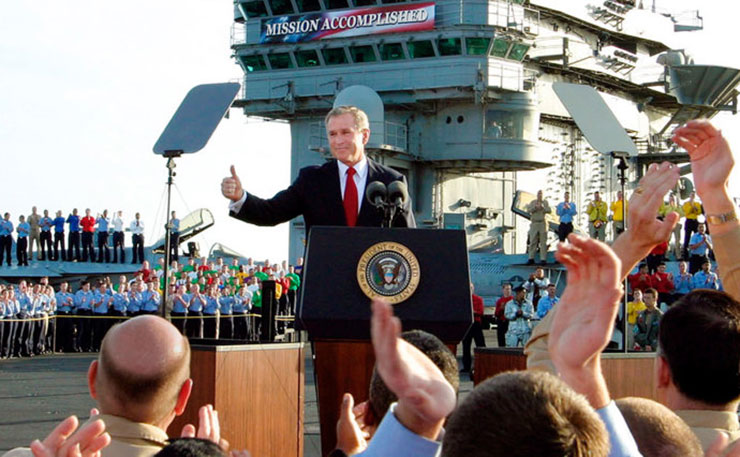
If it was still a little hard to buy the liberty-and-democracy-narrative out of the mouth of the oil cowboy from Texas – and especially from his Vice President and former Halliburton CEO Dick Cheney – with Barack Obama, the subsequent charismatic constitutional lawyer from Illinois, all doubts vanished. Nobel Peace Prize laureate Obama showered eight countries with his bombs to ‘fight for the human rights’ of the oppressed of this world.
But Donald Trump and fanaticism moved into the White House, this interdependence of hard power and soft power was destined to change. Just as Trump never made a big secret out of his shameful racism or his hatred of women, he was always a passionate advocate of the predator mentality of the US empire: “So, in the old days, you know when you had a war, to the victor belong the spoils,” Trump said to ABC News’ George Stephanopoulos in 2011, about Iraqi oil. “You go in. You win the war and you take it.”
Apart from the fact that Trump was caught in the delusion that the US had – in whatever meaning of the word – won the war in Iraq, what he is describing is a war crime.
It is true that the notion the United States should take control of the oil in the Middle East by force has been an integral ideological building block among the right-wing war hawks of the US political establishment for decades. International humanitarian law, however, unambiguously states that the Trump-style exploitation of resources in occupied territories is illegal, as legal scholar Sarah Saadoun explains in the Harvard International Review.
At the end of July, the New York Times headlined, “Trump Finds Reason for the US to Remain in Afghanistan: Minerals”. Businessman Trump considers the world as the US’ very own self-service shop, and has now transferred his philosophy of the militarily secured resource theft to Afghanistan. Trump’s fierce criticism of Obama’s policy on Afghanistan and his general opposition to that war, which he widely expressed as a private individual, are finally buried.
Trump is now in lock step with the war hawks in the US establishment, the people he once set out to fight. Finally, he is ready to continue the Empire policies of his two predecessors – and his much detested opponent Hillary Clinton.
A short glance back.
‘Western Cure Worse Than Taliban Disease’
With its 16 years, the War in Afghanistan is the longest war in US history and has cost the US taxpayer more than $ 2 trillion. George W. Bush dubbed the war his “Crusade” and claimed to have defeated the Taliban an astonishing seven times in four years.
The US invasion in 2001 was already dubious under international law, as Law Professor Ryan T. Williams of the University of Pennsylvania explains, but “its continued military activity more than a decade later does not comport with any existing international law regarding the use of force.”
Thus, another illegal war of the US Empire.
Nearly 100,000 people have been killed directly during the Afghan war, 26,000 dead civilians among them. By the indirect consequences of the war, another 360,000 dead have piled up. The Afghan civilian population is now on the brink of a humanitarian disaster, and their misery is even greater than before the US invasion 2001.
“Western Cure Worse Than Taliban Disease” – says the renowned Middle East analyst Anders Corr. The Karzai puppet regime, bought from Washington and riven by corruption, reactivated the opium trade, which was literally non-existent at the overthrow of the Taliban in 2001 – partly with active support from the CIA – with the result that today more than 90 per cent of the world’s heroin supply originates from Afghanistan.
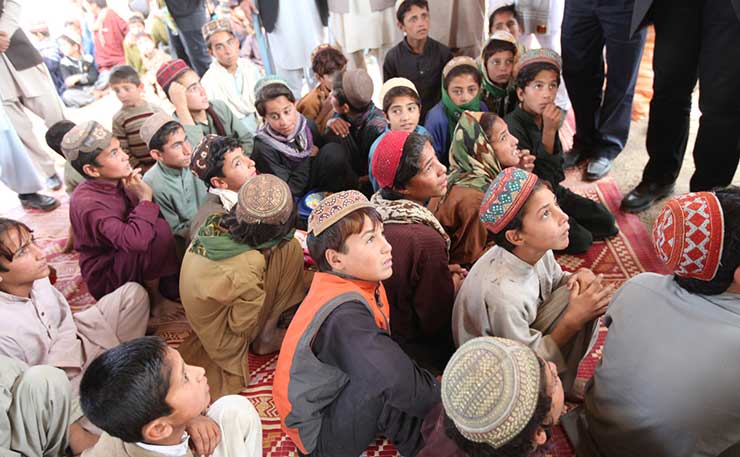
The US military killed one Taliban leader after another. And yet the terrorist organization is now stronger than ever, and has more territory under its control than at any other time since the US invasion of 2001. About 50 percent of Afghanistan is held by the Taliban.
The quasi-religious dogma of all US administrations “Kill the head and you weaken the whole group” has been exposed as nothing but ideologically drive wishful thinking, and has nothing to do with reality. The execution of leaders of established terrorist groups, such as the Taliban, is “highly counterproductive”, as a study by the University of Chicago on the topic of terrorist groups since 1945 unequivocally proves. Rather, the terrorist group would be strengthened by various rebound effects at all levels, the researchers found. In addition to the Taliban, Al-Qaeda has also been reinvigorated in Afghanistan, and ISIS has established an Afghanistan branch as well.
The US is pursuing a scorched earth strategy, and its war has contributed significantly to the destruction of Afghanistan. Donald Trump is, of course, not to blame for this utter mess – the disastrous policies of his predecessors Bush and Obama are. The opportunist Trump, however, exploits this mess now and wants to steal highly valuable natural resources on a large scale in Afghanistan in the near future.
Resource theft by Corporate America
Today’s Afghanistan is a plate-tectonic interface between Eurasia and the ancient supercontinent of Gondwana, which has resulted in massive geological activities which have endowed Afghanistan a unique and rich mineral profile.
Afghanistan’s resources, the German Institute for Rare Earths and Metals explains, “reads like the wish list of an industrial nation”: lithium, copper, uranium, chromium, billions of tons of high-grade iron ore, gemstones, gold, as well as gas, coal, oil, and in particular rare earths.
Already in 2014, LiveScience reported that Afghanistan would sit on resources worth more than $ 1 trillion, while CNBC cited figures from the Afghan Ministry of Mines and Petroleum, which estimated the resource wealth to be $ 3 trillion.
Particularly important is the significant occurrence of rare earths: a mineral group, which is of fundamental importance for the production of all high-tech electronics products – from smartphones to drones to space shuttles. China has by far the largest deposits of rare earths and is also the dominant producer, with nearly eight times the production volume of second-place Australia – a quasi-monopolist.
With its tremendous importance for the global economy, Beijing already uses price manipulation as an economic policy weapon. The rare earths have increasingly become a critical political factor and could play a similar geostrategic central role for the 21st century that oil played in the 20th.
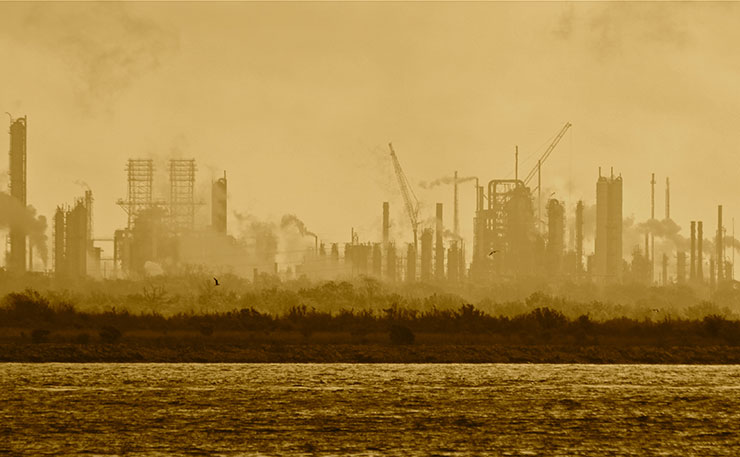
In Afghanistan, the rare earths lie mainly in the Taliban-controlled Helmand province, which is also one of the central war zones. At 1.4 million tons, the Afghan deposit is about the same size as the US’. Under Trump’s ‘go in and take it’ mentality, the US could effectively double its resources of these strategically important metal ores.
Trumps political advisors, lobbyists from the industry – such as the CEO of American Elements, or the owner of the DynCorp mercenary firm – as well as Afghan officials and Afghanistan’s President Ashraf Ghani whispered to the US president, “Afghanistan’s vast mineral wealth could be profitably extracted by Western companies,” reported the New York Times.
While China is the current main investor in Afghanistan’s mines business with investments worth billions of dollars, and Germany being keen on the Afghan lithium deposits in the Helmand province in the south, Trump’s Corporate America now wants its slice of the cake. With the prospect of lucrative deals for US corporations, Trump, who had already announced in his campaign he wants to run the US like a corporation, finally discovered his interest in Afghanistan – a country that was hardly on his radar in the first seven months of his presidency.
With the exception, of course, of the 13th of April, when Trump dropped his phallic symbol on Afghanistan: a weapon of mass destruction, the “Mother of All Bombs”, the largest nonnuclear bomb in history ever dropped on human beings.
By the end of August, less than a month after the New York Times broke the story, Trump finally presented his new strategy for Afghanistan.
“Nothing besides the prospect of more killing.”
In a military base in Arlington, Virginia, Trump gave this keynote address, which was spiked with pompous patriotism, self-adulation, US exceptionalism, glorification of war, and militaristic flatulence. Trump’s one-dimensional analysis of the war showed that he – or rather his speechwriters – clearly do not have even the slightest understanding of the wider Middle East, and of Afghanistan in particular.
In addition to Trump’s typical martial utterances – “attacking our enemies, obliterating ISIS, crushing Al Qaeda” – his speech contained three main points:
1. “We are not nation-building again.”
2. “As the prime minister of Afghanistan has promised, we are going to participate in economic development to help defray the cost of this war to us.”
3. “We are killing terrorists. […] Retribution will be fast and powerful, as we lift restrictions and expand authorities in the field.”
The underlying message of these three points to the Afghans on the ground is this:
1. We are not interested in stability and security in Afghanistan.
2. In complicity with local corrupt elites, we will raid Afghan natural resources.
3. We will kill very many Afghans.
Trump refused to state concrete figures on additional troops to be sent to Afghanistan. The Pentagon, however, spoke of 3,900 additional troops.
“There was nothing in that speech,” said Matthew Hoh of the Center for International Policy, “besides the prospect of more killing.”
Trump’s speech on the escalation of the Afghan war was generally well received, especially in the Trump-critical pro-Hillary camp of the US political landscape: “One of Donald Trump’s finest moments as president,” Paul D. Miller in Foreign Policy smarmed over Trump, a man he used to detest.
Notably, the first time that the US Democrats, which usually indulges in foaming tirades of hate against Trump, gathered in unison behind their president, was when he illegally launched 59 Tomahawk missiles on bashar Al-Assad’s forces in Syria in early April.
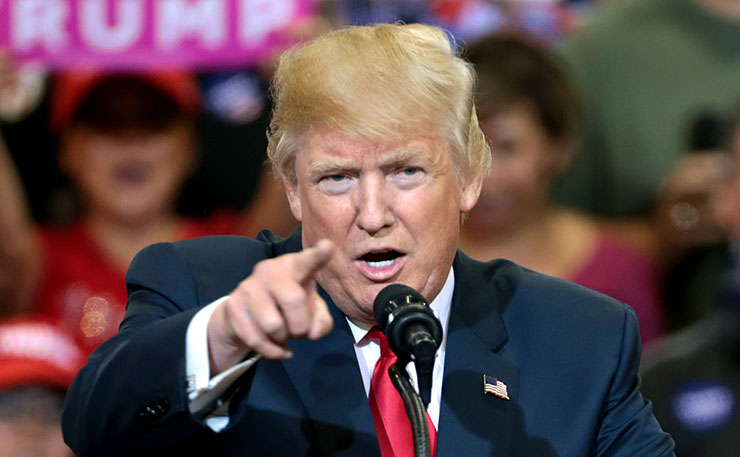
Acts of war have always been a unifying motif in US politics.
A United Nations report published last summer revealed that the number of civilians killed in Afghanistan is at a record high in the 16-year war, particularly as a result of the rising numbers of women and children killed. The number of civilians killed by Afghan and US airstrikes more broadly rose dramatically by 43 per cent over the previous year. In June alone, the US launched 389 air strikes, a “record month” for more than four years.
In October 2015, the US military bombed a hospital in Kunduz operated by Doctors Without Borders for over 30 minutes, killing 42 people.
In June, the US killed 16 Afghan police officers with airstrikes.
Just a few days after Trump’s inauguration in February this year, US fighter jets were “bombing indiscriminately in a heavy residential area” in the Helmand province, killing at least 18 civilians, mostly women and children.
Scrutinizing these appalling figures and reports, it begs one question: What “restrictions” at all could Trump want to lift now?
The mask of the US Empire is falling
Trump’s election victory was chiefly due to the fact that a large part of the US population was sick and tired of the establishment in Washington, and its decades of gray interchangeability.
Trump was the hero of this alienated mass of DC-indifferents, and won the election as the unfaltering, anti-establishment candidate, and first and foremost as the anti-Hillary guy.
But instead of fighting the establishment so much hated by his supporters, Trump has incorporated them into his cabinet, the richest cabinet in US history.
In particular, he was elected to office for his glorified non-interventionism, for the promised end of the regime change policy, for his out of the Middle East rhetoric and his America First jingoism.
In office, he has escalated the wars in Iraq, Syria, and Yemen, he killed already as many civilians in his fight against ISIS as Obama did in his entire term, he bombed Assad forces several times, he ordered drone strikes at five times the rate of “Drone King” Obama, and he will now set Afghanistan ablaze again, out of greed for profit.
As a candidate, Trump shamelessly lied to his followers. As president he spits in their faces.
The times of disguising soft power-skirmishes are over. Trump simply does not conceal his intent to escalate the Afghanistan war in order to steal resources – “defray the cost”, as he calls it.
As Trump drops the mask of the US Empire, the world now looks at its bare face: it is the ugly, rotten grimace of the Empire, to which money and power mean everything, and human life means nothing.
US corporations are getting richer, Afghans will die.
* This article is an edited and translated version of an article that recently appeared on JusticeNow.
Donate To New Matilda
New Matilda is a small, independent media outlet. We survive through reader contributions, and never losing a lawsuit. If you got something from this article, giving something back helps us to continue speaking truth to power. Every little bit counts.

